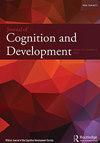Rewards Can Foster Response Execution and Response Inhibition in Young Children Diagnosed with ADHD
IF 2.1
2区 心理学
Q3 PSYCHOLOGY, DEVELOPMENTAL
引用次数: 0
Abstract
ABSTRACT Children with ADHD show deficits in executive functioning, especially the ability to inhibit inadequate responses, and deficits in motivational processes due to dopaminergic dysfunctions. There is evidence that rewards can foster inhibition in children with ADHD. However, most studies examined a wide age range of children above 7 years of age, so almost nothing is known about inhibition and reward effects on inhibition in younger children. The primary goals of the present study were a) to examine response inhibition in young children with ADHD in a relatively narrow age range (5–8 years) in comparison to children without ADHD b) to investigate whether performance in an inhibition task can be fostered by rewards in this young age group. For this purpose, children with ADHD (n = 20) and control children (n = 20) were recruited from schools as well as pediatric, psychiatric, and psychological practices in North Rhine-Westphalia, Germany. Children conducted a Go/NoGo task under a non-rewarded and a rewarded condition. Our findings demonstrate a generally decreased response inhibition in ADHD as compared to control children. Rewards led to improvements in response inhibition in both groups of children. However, in contrast to control children whose ability to inhibit increased with practice in both conditions, children with ADHD inhibition decreased over the course of the non-rewarded condition but was raised by the prospect of a reward at the start of the reward condition. Thus, it seems that already at this young age, German children without ADHD are better able to keep their inhibition ability up over time than children with ADHD.奖励可以促进ADHD儿童的反应执行和反应抑制
摘要患有多动症的儿童表现出执行功能的缺陷,特别是抑制不充分反应的能力,以及由于多巴胺能功能障碍而导致的动机过程的缺陷。有证据表明,奖励可以促进多动症儿童的抑制。然而,大多数研究都对7岁以上的儿童进行了广泛的年龄范围的研究,因此对年幼儿童的抑制作用和奖励作用几乎一无所知。本研究的主要目标是:a)与没有多动症的儿童相比,在相对较窄的年龄范围(5-8岁)内,检查患有多动症的幼儿的反应抑制;b)研究在这个年轻年龄组中,抑制任务的表现是否可以通过奖励来培养。为此,从德国北莱茵-威斯特法伦州的学校以及儿科、精神病和心理实践中招募了患有多动症的儿童(n=20)和对照儿童(n=20)。孩子们在无奖励和有奖励的条件下进行Go/NoGo任务。我们的研究结果表明,与对照儿童相比,多动症的反应抑制作用普遍降低。奖励导致两组儿童反应抑制的改善。然而,与在这两种情况下抑制能力都随着练习而增强的对照儿童相比,患有多动症抑制的儿童在非奖励条件下的过程中有所下降,但在奖励条件开始时受到奖励的前景的影响。因此,似乎在这么小的时候,没有多动症的德国儿童就比患有多动症的儿童能够更好地保持他们的抑制能力。
本文章由计算机程序翻译,如有差异,请以英文原文为准。
求助全文
约1分钟内获得全文
求助全文
来源期刊

Journal of Cognition and Development
Multiple-
CiteScore
4.00
自引率
0.00%
发文量
29
期刊介绍:
The Journal of Cognition and Development is the official journal of the Cognitive Development Society (CDS). Some CDS members are concerned with basic research or theory; others focus on policy issues and practical applications. The range of interests includes cognitive development during all stages of life, and we seek to understand ontogenetic processes in both humans and nonhumans. Finally, their interests encompass typical as well as atypical development, and we attempt to characterize both biological and cultural influences on cognitive change and continuity.
 求助内容:
求助内容: 应助结果提醒方式:
应助结果提醒方式:


